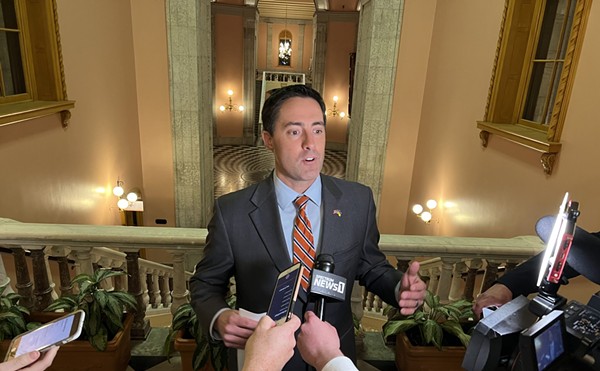The battles surrounding Issue 2 may be lost to some in an election season dominated by county government reform and casino gambling. But if you eat eggs, cheese and meat, and care about the price and quality of your food, the controversial ballot initiative demands attention. Cut through the rhetoric and the dueling images of idyllic farms and maltreated pigs and chickens, and Issue 2 is about using Ohio's constitution to control the future of animal husbandry in Ohio.
The Ohio Farm Bureau, the 60,000-member force behind the November 3 proposal, does not deny that it wants command of how Ohio livestock farmers produce meat, eggs and dairy. Issue 2, if approved, would in essence give Ohio farmers the option to use the controversial livestock cages — the veal, gestation and battery crates loathed by animal-rights activists — that have been prohibited by voters in California, Arizona and Florida. If the constitutional amendment passes, a "livestock care standards board" of governor-appointed food-industry experts would set the rules that impact animal rearing in our state.
This, Issue 2 supporters say, is a pre-emptive strike to prevent animal-rights do-gooders from demanding even more quality control from Ohio farmers, burdens that could saddle food producers with extra costs they'd then pass on to consumers.
Even Don Sprinkle, who raises veal calves and poultry with humane techniques on his Valley City farm, supports Issue 2. Sprinkle, who handed out stickers and brochures on the issue at a local farmer's market, calls the creation of regulation board as "the lesser of two evils." The greater evil: succumbing to demands from the Humane Society of America. "I don't want a radical organization coming in and telling me I have to put my animals in a five-star hotel," he says.
The Humane Society has been on a crusade to improve animal treatment on farms across America, and the organization played a key role in the ban of veal, gestation and battery cages in other states. The group met with the Ohio Farm Bureauin February, making it clear that Ohio, with its roughly 150 factory farms (a.k.a. concentrated animal-feeding operations), was their next goal. One industry observer says the Humane Society likely targeted Ohio because the state ranks second in the country in egg production, according to U.S. Department of Agriculture statistics. The state also ranks in the top 10 in pork and veal production.
Oddly, the Humane Society did not return Scene's requests for comment, but the organization has stated publicly that it wants to eliminate closed-quarter confinement for Ohio's veal calves, pigs and egg-laying hens. "This type of extreme confinement is cruel and inhumane, environmentally damaging, and poses severe public health threats," says the organization in a statement against Issue 2 on its website. "But rather than discussing potential solutions to these problems, the Ohio Farm Bureau is now trying to hastily grab more power than it already has."
Proponents of Issue 2 say the industry polices itself and doesn't need an overhaul. Joe Cornely, a Farm Bureau spokesman, says the Humane Society and other animal-rights groups have mislead people into thinking that Ohio farmers are cruel to their animals. Cornely says the Humane Society's agenda goes beyond controlling livestock care standards. "We do believe that their ultimate agenda is to end man's dominion over animal," he says.
Dick Isler of the Ohio Pork Producers Council speaks in equally histrionic terms, claiming that the standards proposed by animal-rights groups could "decimate agriculture in Ohio." "If the consumer wants cage-free eggs, they can buy them," says Isler. "But to force it on society [is wrong]. Issue 2 lets Ohioans determine what practices are best."
But that depends on what you mean by "Ohioans."
The amendment creates a 13-member board that promises to include family farms, veterinarians, consumers and other food and animal experts. The governor would appoint 11 of those members, and the House and Senate would each chose one of the other two. One political party could select up to seven members, a majority, creating wariness that the board would be marred by politics. Neither the ballot initiative nor the resolution that created it mentions term limits.
Delbert Yoder, an Amish farmer who uses his own husbandry techniques to produce free-range eggs that he then sells at farmers markets, is wary of concentrated power over farmers, but for different reasons. Too much industry uniformity would devalue his specialty products, eggs and cheeses produced with Earth- and animal-friendly techniques. "There is a movement to farm this way, and we value the idea that it was our free choice," says Yoder. "When government makes it a law, we lose freedom."
Yoder says he is able to sell free-range eggs because there's a market for it. "The most powerful vote that can be cast is the one out of your pocketbook," he said.
The 5,200-strong Ohio Farmers Union, which opposes Issue 2, says not all small-operation farmers are against stricter regulation. More rules could bolster the competitiveness of farmers who shun low-cost industrial farm practices. Roger Wise, the president of the OFU, says many Ohio farmers don't use veal cages that restrict the calves from being able to turn around.
"The notion that the [Humane Society] is a boogeyman who is going to control things is false," says Wise. He has called for more negotiation between all parties and says big industry players rushed the ballot issue through the Ohio legislature in two-and-a-half days.
The state constitution should not be the vehicle for implementing livestock standards, says Wise. In his eyes. Issue 2 passage would result in an "autonomous, unchecked layer of bureaucracy" controlled by Ohio's largest farming operations, which make up less than 1 percent of Ohio's 75,000 farms.
And if Issue 2 passes, it won't prevent the Humane Society from going ahead with plans for a voter ballot initiative next year to ban specific factory-farming practices.
The Ohio Farm Bureau and its allies are banking on the idea that voters will reject a reform measure next year if they already approved the creation of a governing board.
But neutral analysts make an important point: With this food fight taking place in the constitution, the measures that make it in would take a great effort to change in the long run, cementing control for whatever special interest comes out on top.
Chef and sustainable food pioneer Parker Bosley opposes Issue 2. See page 30.











